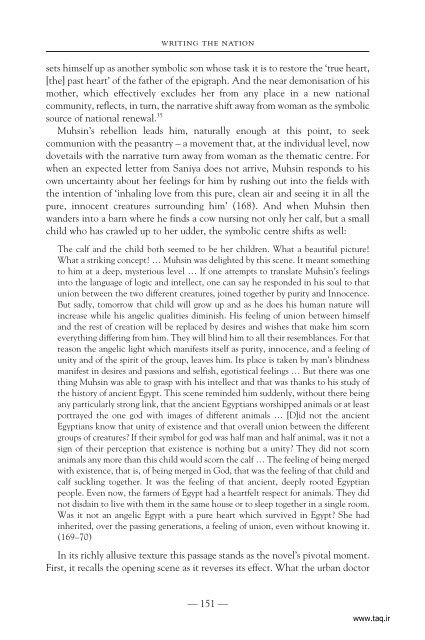LITERATURE AND NATION IN THE MIDDLE EAST
LITERATURE AND NATION IN THE MIDDLE EAST
LITERATURE AND NATION IN THE MIDDLE EAST
- No tags were found...
You also want an ePaper? Increase the reach of your titles
YUMPU automatically turns print PDFs into web optimized ePapers that Google loves.
writing the nationsets himself up as another symbolic son whose task it is to restore the ‘true heart,[the] past heart’ of the father of the epigraph. And the near demonisation of hismother, which effectively excludes her from any place in a new nationalcommunity, reflects, in turn, the narrative shift away from woman as the symbolicsource of national renewal. 35Muhsin’s rebellion leads him, naturally enough at this point, to seekcommunion with the peasantry – a movement that, at the individual level, nowdovetails with the narrative turn away from woman as the thematic centre. Forwhen an expected letter from Saniya does not arrive, Muhsin responds to hisown uncertainty about her feelings for him by rushing out into the fields withthe intention of ‘inhaling love from this pure, clean air and seeing it in all thepure, innocent creatures surrounding him’ (168). And when Muhsin thenwanders into a barn where he finds a cow nursing not only her calf, but a smallchild who has crawled up to her udder, the symbolic centre shifts as well:The calf and the child both seemed to be her children. What a beautiful picture!What a striking concept! … Muhsin was delighted by this scene. It meant somethingto him at a deep, mysterious level … If one attempts to translate Muhsin’s feelingsinto the language of logic and intellect, one can say he responded in his soul to thatunion between the two different creatures, joined together by purity and Innocence.But sadly, tomorrow that child will grow up and as he does his human nature willincrease while his angelic qualities diminish. His feeling of union between himselfand the rest of creation will be replaced by desires and wishes that make him scorneverything differing from him. They will blind him to all their resemblances. For thatreason the angelic light which manifests itself as purity, innocence, and a feeling ofunity and of the spirit of the group, leaves him. Its place is taken by man’s blindnessmanifest in desires and passions and selfish, egotistical feelings … But there was onething Muhsin was able to grasp with his intellect and that was thanks to his study ofthe history of ancient Egypt. This scene reminded him suddenly, without there beingany particularly strong link, that the ancient Egyptians worshipped animals or at leastportrayed the one god with images of different animals … [D]id not the ancientEgyptians know that unity of existence and that overall union between the differentgroups of creatures? If their symbol for god was half man and half animal, was it not asign of their perception that existence is nothing but a unity? They did not scornanimals any more than this child would scorn the calf … The feeling of being mergedwith existence, that is, of being merged in God, that was the feeling of that child andcalf suckling together. It was the feeling of that ancient, deeply rooted Egyptianpeople. Even now, the farmers of Egypt had a heartfelt respect for animals. They didnot disdain to live with them in the same house or to sleep together in a single room.Was it not an angelic Egypt with a pure heart which survived in Egypt? She hadinherited, over the passing generations, a feeling of union, even without knowing it.(169–70)In its richly allusive texture this passage stands as the novel’s pivotal moment.First, it recalls the opening scene as it reverses its effect. What the urban doctor— 151 —www.taq.ir






